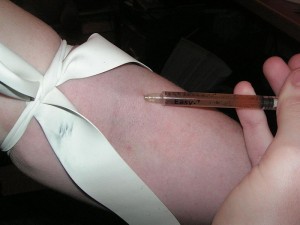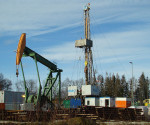Opioid Use In Oil Field Injuries Reaches Epidemic Proportions
Recently, the Centers for Disease Control and Prevention released the latest statistics about opioid use in the workplace. The cases of opioid overdose in the US has reached epidemic proportions. The issue isn’t that workers are getting their prescription drugs from a dealer, though. Quite the contrary, they are getting them from a doctor’s prescription pad. But, in most cases—especially in the personal injury field of the oilfield industry—the medications are not only warranted but necessary.

Public domain photo/Psychonaught
The oilfield and offshore drilling industry is a dangerous one, and it also comes with inherent risks for things like falls, ergonomic injuries, and other injuries that predispose workers to need the assistance of pain killers. The problem is that many doctors and workers misuse opioids for chronic maintenance instead of their intended use, to get through the recovery and healing stage. This is creating a huge problem in workplaces across the US, and especially in workplaces where being focused and aware can make the difference between life and death.
According to a oilfield injury lawyer, as much as 25% of medical costs for injured workers is allocated to prescription drug costs, and those estimates continue to rise. Although the paradigm in the medical field is starting to shift to more therapy-focused care, the need for painkillers still exists. When it comes to the major types of injuries sustained by oilfield and offshore workers like burns, ergonomic injuries, and slip and fall injuries, the need for prescription opioids are the only humane way to treat an injured worker.
Once a worker has been prescribed opioids for their injuries, they have a heightened potential for addiction. It is that addiction that has them returning to work still using, which sometimes clouds their judgment and is responsible for not just further injury to themselves but to others around them. There are also times when opioid use keeps workers from returning to work and being productive.
Oilfield and offshore injuries are different because they’re handled in another compensation category than other industries. Unlike other workplaces, offshore injuries are handled through something called Maritime Law. Within Maritime Law is something called maintenance and cure. It is a provision that the injured worker is eligible to have the employer pay for their day-to-day bills and maintenance until a time when the worker has medically improved as much as they can. When opioid use is involved, that recovery might be substantially longer and can lead them to be off the job for a longer period of time.
For dangerous occupations such as oilfield and offshore workers, not being completely aware can impact the ability of the worker to make quick, common sense judgments about their actions, which will not only hurt them but could be the cause for hundreds of workers being injured. With hazards like explosions and line bursts, just one wrong move can cause an entire rig to explode, killing hundreds of workers in an instant. That is a grave risk for the offshore drilling industry.
So how does the offshore industry tackle the overuse of opioid drugs?
One way that businesses can cut back on their liability for the maintenance and cure that is required through Maritime Law is to have more strict and consistent contact with the employee while they are recovering. It’s also a good idea to have a liaison that works closely with the physician and the employee to ensure that they are utilizing different types of rehabilitation and following through to expedite the worker’s healing and their return to work.
Hand picking physicians to work with your business’s injured workers is also an excellent way to safeguard everyone’s health. It makes it easier to control what goes on while the worker is both on leave and after they return to the workplace. Knowing what the worker’s stage of recovery is and how heavy their need or use of opioids is before they return to work is imperative to safeguard the workplace environment, as well as the individual themselves.
There is a growing epidemic in the country with workers and opioid use. For the offshore and oil industry, this epidemic is about more than just lower productivity; it can mean the difference between catastrophic accidents and people’s lives. That is why businesses have to take a better look at how they can control for drug use in their workers to avoid personal injury lawsuits.
Author: Ben Obirek














